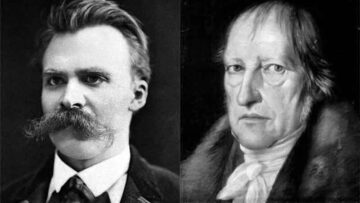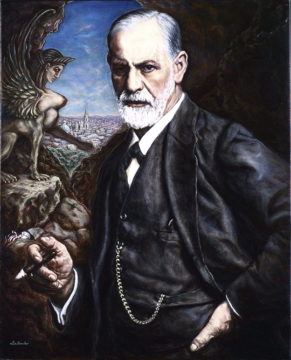Conversation with a Centrist
What Remains of Existentialism?

by Christopher Horner Existentialism was my introduction to the world of philosophy. I was first drawn in by its core idea, that individuals forge their own identities through their actions and, through the values they embrace. This notion held appeal for a young man searching for identity beyond family ties, a philosophy both romantic and…
Palestine and The West: The Parallax View

by Christopher Horner Appearances can change. This can be because the thing you are viewing has changed, or because you have moved, so what was there anyway now looks different. In a ‘parallax shift’ an object’s position appears to change when viewed from a new vantage point. This latter is what is happening in the…
Being Good After Hegel and Nietzsche
Beyond Moralism
The Natural Selection of Books

by Christopher Horner Nothing odd will do long. Tristram Shandy did not last – Dr. Johnson. Where are the authors of yesterday? And where will today’s be tomorrow? Look for some principle of sorting, some logic to the winnowing process that consigns this to the bin and that to perpetual presence. You won’t find it. I wish…
Frozen Thought

by Christopher Horner In daily life we get along okay without what we call thinking. Indeed, most of the time we do our daily round without anything coming to our conscious mind – muscle memory and routines get us through the morning rituals of washing and making coffee. And when we do need to bring…
Disavowed Knowledge

by Chris Horner Things we don’t want to know that we know. Donald Rumsfeld’s famous distinctions between knowledge and ignorance: [T]here are known knowns; there are things we know we know. We also know there are known unknowns; that is to say we know there are some things we do not know. But there are…
The Absent Self

by Christopher Horner Insist on your self; never imitate. —Emerson How can a man of consciousness have the slightest respect for himself? —Dostoevsky The key promise of the modern world was the freedom of the individual. It was the motivating cry of the great revolutions of the modern age, meaning two things, at least: first,…
Unconscious Freedom

by Christopher Horner Become That which You Are —Nietzsche. What is it to lead a free life? Perhaps it is doing what we want with the minimum of external constraints, so we can follow our desires. Also to be free from anything within us that would prevent us from choosing wisely and acting effectively. I…
This Mediated World

by Christopher Horner Immediacy itself is essentially mediated —Hegel Look at that desk in front of you right here, now. Isn’t it just there, a bare existence, a simple immediate thing right in front of you? The senses register its presence. This, at least, is a bare fact that you know. But look again at…
Mortal Thoughts

by Chris Horner Death is not an event in life: we do not live to experience death —Wittgenstein The anaesthetic from which none come round —Phillip Larkin What can we do with the thought of death? Nothing can be done about death: you, me, everyone will die. Thinking can’t remove the fact. But the thought…
Against Self Improvement: The Negative Capability of Everyday Life

by Chris Horner Negative Capability, that is, when a man is capable of being in uncertainties, mysteries, doubts, without any irritable reaching after fact and reason… —Keats. To become mature is to have regained the seriousness one had as a child at play. —Nietzsche Why do we want to know ourselves? Self knowledge seems like…
On Not Getting What We Want
What Art Can Do
Determined To Be Annoying

by Chris Horner Imagine you are put in regular close contact with someone who regularly makes your life difficult. This could be at work, or a flat share, anything. They leave you to finish the chores they start, invade your space, and generally act in an inconsiderate way. You’d like to put some space between…
Undead Freud
The World, The Text and the Reader

by Chris Horner What should we look for in literature? And in the arts and humanities in general? It’s a large question with many answers, some better than others: entertainment, edification, elevation – and much more. A more limited question might be: what is the point of studying it? Let’s stick with literature as our…
Stoicism as Symptom

by Chris Horner The general terms ‘true’ and ‘good’ or ‘wisdom’ and ‘virtue’, with which stoicism is stuck, are on the whole undeniably uplifting, but because they cannot in fact end up in any kind of expansion of content, they quickly start to become tiresome. —Hegel [1] Stoicism seems to be everywhere at the moment,…







